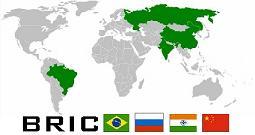BRIC - Now It Is Brazil's Time
Juliana Girardelli Vilela*
 The BRIC acronym was coined by Jim O'Neill, head of economic researchers at Goldman Sachs bank, to refer to the world's primary four emerging countries: Brazil, Russia, India and China. Based on studies conducted by him and his team on estimated market evolution, production and demography, they concluded that by 2050 these four countries will be the world's top economies, accounting for more that 40% of the world's population and a GDP exceeding 85 trillion dollars.
The BRIC acronym was coined by Jim O'Neill, head of economic researchers at Goldman Sachs bank, to refer to the world's primary four emerging countries: Brazil, Russia, India and China. Based on studies conducted by him and his team on estimated market evolution, production and demography, they concluded that by 2050 these four countries will be the world's top economies, accounting for more that 40% of the world's population and a GDP exceeding 85 trillion dollars.
China's situation is quite peculiar because of its shift from socialism to capitalism, which is expected to be completed by 2050. No one knows whether its government will remain totalitarian or whether the country will grow to become a Western-like democracy. Regardless, enhancing its consumer role in the economy, curtailing public spending, and boosting its financial system are all required steps for China to meet the expectations of Goldman Sachs' study. Such measures are crucial for China to sustain its accelerated growth, which has permitted the transformation of 200 to 300 million peasants into blue-collar workers over the past few years. It is worth emphasizing that China's GDP was said to have reached 2.3 trillion in 2005, and is estimated to reach almost 50 trillion dollars in 2050. In other words, it would represent more than the total wealth produced in the world today.
This is possible because China currently plays a deflationist role that is extremely important in the global economy. Just as England offered the whole world cheap goods in the XIX century, today China does the same, permitting even unemployed workers to buy products. Had these products been manufactured in Europe or the United States, prices would likely be beyond their reach. Ironically, many of these unemployed individuals are found in the European and US manufacturing markets, and are without a job precisely because of Chinese competition. China has become the world's largest factory, producing all sorts of manufactured goods, textiles, toys, computers and capital assets at unbeatable prices. However, it is important to note that the country has overcome its phase of being only a producer of cheap goods and now also offers high-tech products.
Brazilian democracy is multi-party and is supported by freedom of expression that helps the country negotiate social changes, unlike China and Russia India's challenges, in addition to curbing red tape and corruption, include speeding up investments in infrastructure and trade, downsizing its consumption role, and revamping its educational system in order to cover a larger number of people. It is a known fact that in the early nineties, India experienced a surge of liberalizing reforms. Today's growth rate of 7% suggests the country stands a strong chance of attaining the top growth rate among the BRIC countries. Thanks to the high investment made in technology and in the professionalization of its population, the country has emerged as a key player in the computer services segment. Now India is entering into the medicines and cars segments as well.
Russia's largest challenge, on the other hand, is to decrease its oil dependence. It is currently the most oil-dependant of the four BRIC countries, despite having oil and gas reserves sufficient to cope with China's growing energy-consumption needs. This country also needs to carefully monitor foreign currency and do its best to boost productivity in several economic segments. Within the BRICs, Russia's role is similar to that of Brazil, as a commodities supplier and large farming and cattle raising producer. This is very strategic to the extent that it will permit the country to feed its large population. Furthermore, it may have to play an outstanding role exporting top-quality manpower and state-of-the-art technology, both legacies from the Cold War.
Brazil's deficiencies mainly deal with education, infrastructure, corruption, and public spending. The role of education is extremely relevant in globalization, because a high level of teaching quality has become a precondition for a country to rank competitively worldwide. If lower-level education persists, there will be no qualified manpower to produce breakthroughs, much less to cope with the demands of modern times. Brazil also needs to invest in infrastructure to enable the country's development. In addition, it needs to open its economy in terms of trade and foreign investment, and to adopt a more efficient and transparent pattern of running the country's business.
Within the BRICs, Brazil's participation tends to be most important as a farming and cattle exporter, by virtue of the need to feed more than 40% of the world's population. The sugar cane produced in Brazil will be vital for the production of renewable and ecologically correct fuels, such as alcohol and biodiesel. Furthermore, Brazil supplies essential commodities (such as steel and aluminum) to developing countries, and also accounts for the world's largest water reserves. The combination of these factors places the country in avery comfortable trade position among BRIC members, because it is an expert in products needed by both China and India.
Some analysts believe that Brazil is not likely to continue to rank as a BRIC country given its low economic growth rates when compared to those of its peer countries, particularly China. However, the truth is that this thesis is rather hasty, as these countries are undergoing different growth phases. China, for example, is undergoing the brown field phase, where everything is yet tobe built in the country. Brazil, in turn, is experiencing the green field phase, because the country already has some infrastructure, with a predominantly urban population and an already existing middle class. It has already lived its brown field phase, and therefore the important aspect is not that Brazil attain exponential growth rates, but rather that its growth be constant.
Additionally, since the return of civil governments in 1985, Brazil has undergone a number of reforms that resulted in the opening of the economy and transformed it into a global trader. Moreover, social problems have been tackled leading to the slashing of inequality rates. The fact is that Brazil has solved three of its major problems: inflation, debt, and democracy. Inflation was curtailed with the adoption of the Real Plan in 1994, after the establishment of a system with inflation targets that led to an inflation drop from 2,500% in 1993 to the current 4.7%. Public spending dropped to 42.2% of the GDP and, despite it still being high, now is denominated in Reais and not in dollars. Lastly, democracy is mature and solid, although it still has a long way to go.
This context was examined in April by the British magazine 'The Economist', which decided that Brazil enjoys several advantages if compared to its BRIC partners:
(i) in Brazil, 83% of Brazilians live in cities and the division between countryside and city is not as threatening as in India and China;
(ii) Brazilian democracy is multi-party and is supported by a freedom of expression that helps the country negotiate social changes, unlike in China and Russia;
(iii) Brazil does not exhibit an aggressive nationalism dogging the country from time to time, as happens in the other countries.
Even if it fails to meet the targets intended by 2050, the BRIC phenomena has already proven its importance by suggesting the disappearance of the idea of polarity and the so-called "North rich, South poor" perspective. The hegemony thesis (the decline and replacement of empires) is not very valid anymore because the world today is no longer based solely on commodities and the force of machines. Current economic trends move toward the domain of knowledge; power will be consequently diluted among several countries capable of developing it. This revolution has already been started by the BRIC members. Those who believe that Brazil is isolated within the BRICs are mistaken. In addition to all its economic potential, Brazil is a country where the rule of law is already a reality. There is no doubt that Brazil shall be a major support of the BRIC group, helping the expectations for 2050 become a reality.
________________
*Lawyer at Peixoto E Cury Advogados Law Firm in São Paulo.

________________